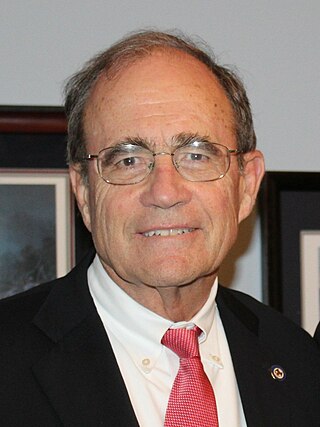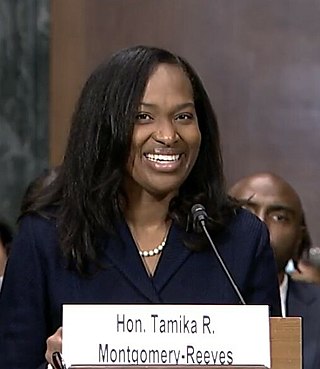
William Lowe Waller Sr. was an American politician and attorney. A Democrat, Waller served as the 56th governor of Mississippi from 1972 to 1976. Born near Oxford, Mississippi to a farming family, Waller went to law school and in 1950 established a law practice in Jackson. Nine years later, he was elected District Attorney of Hinds County, Mississippi. Waller attempted to reform the position and provoked the ire of local law enforcement for aggressively prosecuting several cases. In 1964, he twice prosecuted Byron De La Beckwith for the murder of civil rights activist Medgar Evers, with both trials resulting in deadlocked juries. In 1967, he launched an unsuccessful campaign for governor, finishing fifth in the Democratic primary.

The Mississippi Republican Party is the Mississippi state affiliate of the United States Republican Party. The party chairman is Frank Bordeaux, and the party is based in Jackson, Mississippi. The original Republican Party of Mississippi was founded following the American Civil War, and the current incarnation of the Mississippi Republican Party was founded in 1956. The party would grow in popularity after the 1964 Civil Rights Act and is currently the dominant party in the state.

Jonathan Tate Reeves is an American politician serving since 2020 as the 65th governor of Mississippi. A member of the Republican Party, Reeves served as the 32nd lieutenant governor of Mississippi from 2012 to 2020 and as the 53rd Mississippi State Treasurer from 2004 to 2012.

Charles Delbert Hosemann Jr. is an American politician and attorney who has been the lieutenant governor of Mississippi since January 2020. From 2008 to 2020, he served as the secretary of state of Mississippi.

Dewey Phillip Bryant is an American politician who served as the 64th governor of Mississippi from 2012 to 2020. A member of the Republican Party, he was the 31st lieutenant governor of Mississippi from 2008 to 2012 and 40th state auditor of Mississippi from 1996 to 2008. Bryant was elected governor in 2011, defeating the Democratic nominee Mayor Johnny DuPree of Hattiesburg. He was re-elected in 2015, defeating Democratic nominee Robert Gray.
Grady Franklin "Gray" Tollison is a Republican member of the Mississippi Senate, representing District 9 since 1996. In January 2012, Tollison was appointed Chairman of the Senate Education Committee by Lt. Governor Tate Reeves. From 2004 until 2012, he served as Chairman of the Judiciary, Division “B” Committee under the leadership of Lt. Governor Phil Bryant and Lt. Gov. Amy Tuck. He also serves as a member of the Rules, Finance, Public Health and Welfare, Universities and Colleges, and Wildlife, Fisheries and Parks Committees.

The Supreme Court of Mississippi is the highest court in the state of Mississippi. It was established in 1818 per the terms of the first constitution of the state and was known as the High Court of Errors and Appeals from 1832 to 1869. The court is an appellate court. The court consists of nine justices elected in nonpartisan contests from three districts to serve eight-year terms. The most senior justice serves as the chief justice. It is housed in the Carroll Gartin Justice Building in Jackson, Mississippi, the state capital.

Carlton Wayne Reeves is a United States district judge of the United States District Court for the Southern District of Mississippi and chair of the United States Sentencing Commission.
Leslie D. King is an associate justice of the Supreme Court of Mississippi.

Lynn Fitch is an American lawyer, politician, and the 40th Mississippi Attorney General. She is the first woman to serve in the role and the first Republican since 1878. Previously, she was the 54th State Treasurer of Mississippi from 2012 to 2020.

James W. Kitchens is an American jurist who served as a justice of the Supreme Court of Mississippi for the Central District from 2009 to 2025. He served as one of two presiding justices, from 2017 to 2025. A graduate of the University of Southern Mississippi and the University of Mississippi School of Law, Kitchens was elected the district attorney for Mississippi's 14th Judicial District three times from 1971 to 1982, representing Copiah, Lincoln, Pike, and Walthall counties. During his tenure as district attorney, he survived an assassination attempt that resulted in wounds to his hand and leg.

A general election was held in the U.S. state of Mississippi on November 3, 2015. All of Mississippi's executive officers were up for election. Primary elections were held on August 4, 2015, with primary runoffs to be held on August 25, 2015 if no candidate received a majority in the primary. The filing deadline for primary ballot access was February 27.
Daniel McKinnon Lee Sr. was a justice of the Supreme Court of Mississippi from 1981 to 1998, serving as chief justice from 1995 to 1998.
Francis S. Bowling was a justice of the Supreme Court of Mississippi from 1977 to 1984.
Vernon Herrin Broom was an American lawyer and judge who served as a justice of the Supreme Court of Mississippi from 1973 to 1984.

The 2019 Mississippi gubernatorial election took place on November 5, 2019, to choose the next governor of Mississippi. Incumbent Governor Phil Bryant was ineligible to run for a third term due to term limits. The Democratic Party nominated incumbent Attorney General Jim Hood, the only Democrat holding statewide office in Mississippi; the Republican Party nominated incumbent Lieutenant Governor Tate Reeves. In the general election, Reeves defeated Hood by a margin of 5.08%, with Reeves significantly underperforming Donald Trump, who won the state by 17 points in 2016.

The 1963 Mississippi gubernatorial election took place on November 5, 1963, in order to elect the Governor of Mississippi. Incumbent Democrat Ross Barnett was term-limited, and could not run for reelection to a second term.

Tamika Renee Montgomery-Reeves is an American lawyer who serves as a United States circuit judge of the United States Court of Appeals for the Third Circuit. She previously served as an Associate Justice of the Delaware Supreme Court.

Wayne Oliver Burkes was an American politician, Baptist minister, and military officer.

The 2023 Mississippi gubernatorial election was held on November 7, 2023, to elect the governor of Mississippi. Incumbent Republican governor Tate Reeves won re-election to a second term, defeating Democratic nominee, Public Service Commissioner Brandon Presley.
















